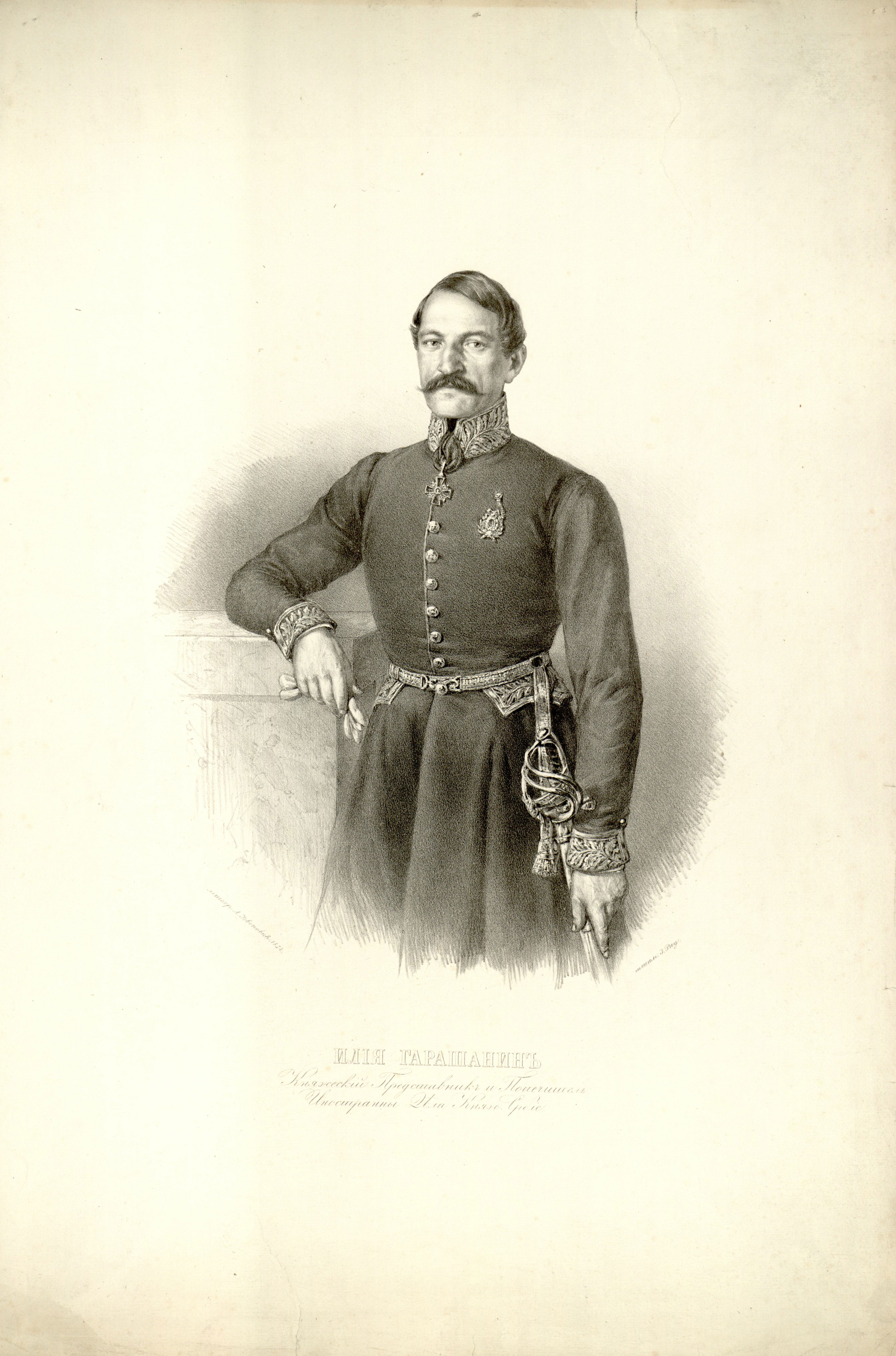- Ilija Garašanin
Infobox_President
name=Ilija Garašanin
Илија Гарашанин
nationality=Serbian

order=1st President of the Ministry of Serbia "(1861 - 1867)"
term_start=21 October ,1861
term_end=15 November ,1867
predecessor=Filip Hristić
(as Prince's Representative)
successor=Jovan Ristić
birth_date=birth date|1812|1|28
birth_place=Garaši ,Ottoman Empire
dead=dead
death_date=death date and age|1874|6|22|1812|1|28
death_place=Grocka , Serbia
spouse=
party=
vicepresident=
Ilija Garašanin (Serbian
Cyrillic : "Илија Гарашанин") (1812 — 1874) was a politician inSerbia having considerable influence in national affairs.Ilija was the son of a Serbian
peasant , who made money by exporting cattle and pigs toAustria and by his intelligence and wealth attained to a certain influence in the country. He wanted to give his son as good an education as possible, and therefore sent him toHungary to learn first in a Greek and then in a German school. Highly gifted, and having passed through a regular although somewhat short school training, the young Ilija very quickly came to the front.In 1837, Prince Miloš Obrenović appointed him a colonel and commander of the then just organized regular army of Serbia and, later in the year, the military police. In 1840, Garasanin faced exile in
Constantinople . In 1842, he was nominated to Serbian Governing Council, later in the year, interior minister. From that time until his retirement from public life in 1867 he was repeatedly minister of home affairs, distinguishing himself by the energy and justice of his administration.Nevertheless, Garasanin rendered far greater services to his country as minister for foreign affairs. He was the first Serbian statesman who had a political programme, and who worked to replace the Russian protectorate over Serbia by the joint protectorate of all the great powers of
Europe . As minister for foreign affairs in 1853 he was decidedly opposed to Serbia joiningRussia in war againstOttoman Turkey and the western powers. His anti-Russian views resulted in PrinceMenshikov , while on his mission inConstantinople , 1853, peremptorily demanding from the prince of Serbia (Alexander Karađorđević) his dismissal. But although dismissed, his personal influence in the country secured the neutrality of Serbia during theCrimean War . He enjoyed esteem inFrance , and it was due to him that France proposed to the peace conference of Paris (1856) that the oldconstitution , granted to Serbia by Turkey as suzerain and Russia as protector in 1839, should be replaced by a more modern and liberal constitution, framed by a European international commission. But the agreement of the powers was not secured.Garashanin induced Prince Alexander Karageorgevich to convoke a national assembly, which had not been called to meet for ten years. The assembly was convoked for
St Andrew's Day 1858, but its first act was to dethrone Prince Alexander and to recall the old Prince Miloš Obrenović. When after the death of his father Miloš (in 1860) Prince Mihailo Obrenović ascended the throne, he entrusted the premiership and foreign affairs to Ilija Garašanin. The result of their policy was that Serbia was given a new, although somewhat conservative, constitution, and that she obtained, without war, the evacuation of all thefortress es garrisoned by the Turkish troops on the Serbian territory, including the fortress of Belgrade (1867).Garashanin was preparing a general rising of the Balkan nations against the Turkish rule, and had entered into confidential arrangements with the
Romanians ,Albanians ,Bulgarians andGreeks , and more especially with fellow Serbs inMontenegro . But the execution of his plans was frustrated as in 1867 Garašanin was suddenly discharged, probably because he objected the marriage of Prince Michael and Katarina Konstantinović. His dismissal caused energetic protests ofRussia , and more especially by the assassination of Prince Michael a few months later (theJune 10 1868 ). When the assassination took place, he was inTopčider (a place where Mihailo was killed) and immediately went toBelgrade to inform the ministers about assassination. Thanks to his nerve, quick measures were taken to preserve order. Last years of his life, Garašanin spent away from politics, on his estate inGrocka .Ilija Garašanin was very conservative in internal politics. He believed that bureaucracy was the only way for administration to work. In foreign politics, he was the first pro Yugoslav statesman among Serbs. He considered that only great Yugoslav state can maintain its independency from both Russia and
Austria . Garašanin left behind a vast (still not published) political correspondence. He certainly was one of the most gifted statesmen whom Serbia had in the 19th century.ee also
*
Conservatism in Serbia References
*
Wikimedia Foundation. 2010.
